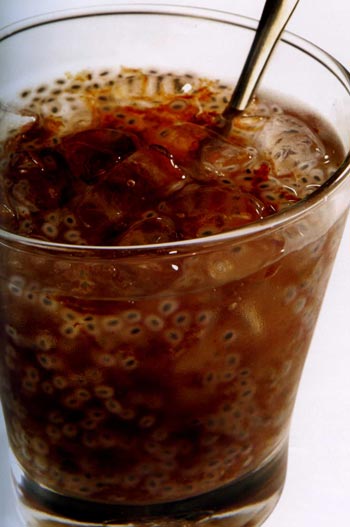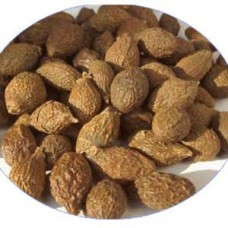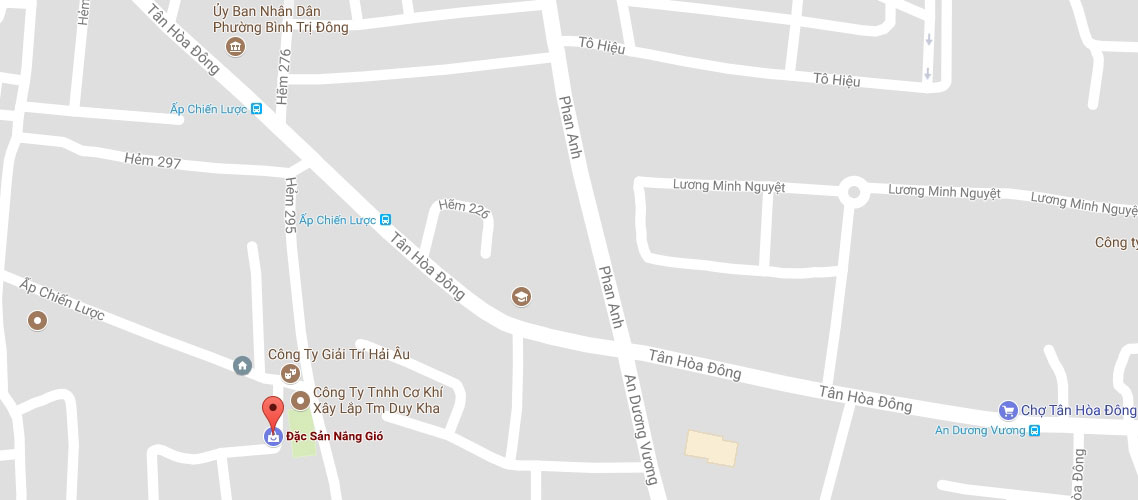Malva nut tree (Pang da hai) is a species of tree in the genus Sterculia, native to mainland Southeast Asia. Its seed is used in traditional Chinese medicine as a coolant and it also used for gastrointestinal disorders and for soothing the throat. As a result it is collected as a major non-timber forest product in Laos, and that country's second export crop after coffee.
The flesh surrounding the dried seeds swells to eight times its original volume when soaked in water, forming an irregularly shaped, reddish gelatinous mass. After being soaked and the seed kernel removed, the flesh is mixed with granulated white sugar, ice, and soaked basil seeds, and drunk as a cooling drink in Vietnam, Thailand, Laos and Cambodia. They are sometimes also used, along with other ingredients, in sweet, cool soups similar to the Chinese tong sui
In China, malva nut is used in tea as well by mixing with other ingredients such as sugar candy, red date, haw, liquorice, chrysanthemun flower, lilyturfroot, and jasmine tea. The advantage of such tea is believed to reduce the "hotness" of the body, and nurture the body.
Malva nuts in traditional Chinese medicine
According to Chinese medicine, the use of "sterculia lychnophora," or "Pang Da Hai" is to remove heat from the lung, to cure sore throat, to counteract toxicity, and to moisten the bowels. Specific symptoms treated include: hoarseness of voice, dry cough or productive cough with yellow sticky sputum, sore, dry throat due to heat in the lung and constipation with headache and bloodshot eyes. Consume malva nut by adding one or two nuts to a large cup of boiling water and consume the liquid. Typically, in traditional Chinese medicine, malva nut would be part of a larger formula of herbs designed to address a person's condition.
Although it possesses medicinal properties, care must be taken with its consumption. Avoid boiling more than 3 seeds per drink. Overconsumption symptoms include white watery phlegm, nausea, coughing, and swollen tongue. People with frequent digestion problems and abdominal pain or diarrhea should avoid it entirely.
Sterculinine is a bio-active alkaloid found in Sterculia lychnophora.
Nut of malva benefits
Medicinally it is first recorded in Ben Cao Gang Mu Shi Yi (Supplements to Compendium of Materia Medica). It is named Pang Da Hai, literally “fat sea”, because its cracked rind will expand and almost fill the entire cup once it is placed in boiling water. So, plenty of water is required when this nut is cooked or soaked.
From the perspective of traditional Chinese medicine, it has two major healing properties. On the one hand, it can relax the bowels, especially constipation caused by internal fire; on the other hand, it cools and disperses lung qi. Because of that, firstly it can be used for the treatment of acute pharyngitis and tonsillitis induced by wind-heat attacking the lung. In this case, 3 to 5 nuts soaking and making tea is highly recommended. Secondarily, it relieves sore throat after flu shot or wind-heat cold induced fever, scratchy sore throat, dry cough without phlegm, voice loss, and mild or extremely swollen sore throat, and so on. In this case, making tea with 5 nuts and 3 grams Gan Cao (licorice root) is a good try. Besides of making tea, it can be still made into refreshing summer desserts and iced drinks for sore throat, chronic pharyngitis, phlegm, voice loss, etc. By the way, keep in mind to stop it no matter it works or not after it has been drunk for 2 straight days.
Modern pharmacological actions of malva nut
1. Bassorin contained can result in the contraction of vascular smooth muscle, improve mucosal inflammation, and relieve spastic pain;
2. Its water extract can promote bowel movements and act as a laxative. And the kernel is with the strongest effect;
3. Its kernel solution, made from dry fat-free powder, has a hypotensive effect on cat.
Sample recipes of malva nuts on herbal remedies
Chinese Pharmacopoeia says that it is sweet in flavor and cold in nature and it goes to meridians of lung and large intestine. Key functions are to clear heat and moisten lung, relieve sore throat and internal heat, and relax bowel. Essential malva herb uses and indications include lung-heat induced husky voice, dry cough accompanied with no phlegm, dry sore throat, constipation caused by heat accumulation, headache, and red eyes. Recommended dosage is from 2 to 3 pieces in soaking in boiling water for tea or decoction.
1. Stewing 5 nuts and 5 grams licorice for tea can be a cure for voice loss, dry cough, dry sore throat, and painful swollen gums that is caused by exogenous pathogenic factors.
2. The tea, by soaking a few nuts with boiling water and rock sugar, can cure blood in stool due to heat.
Nut of malva side effects and contraindications
Modern pharmacological studies have found that malva nut is with some toxicity and long-term use of it is inadvisable. Other studies show that it can promote the peristalsis of the small intestines and then result in laxative effect, which may do harm to those who are prone to diarrhea; it has antihypertensive effect. Therefore, long-term use may lead to the risk of low blood pressure in people who have normal blood pressure or low blood pressure; the water extract of its peel, soft shell, and kernel are found with a certain analgesic effect. Currently the mechanism remains unknown. But one thing’s for certain that long-term use of it is also potentially dangerous if the analgesic effect comes from inhibition of the nerve center. Also, clinically a few people were found with an allergic reaction, which is manifested as systemic itching, diffuse flushing, large papules and wheal all over the body, lip swelling, dizziness, palpitation, chest tightness, nausea, fall of blood pressure, etc.
TCM wise, although considered a common remedy for sore throat it is not suitable for the following situations:
1. Deficiency-cold in spleen and stomach. The signs and symptoms include decreased appetite, cold pain in abdomen, abdominal pain relieved by warmth, pressure-relieved abdominal pain, preference for hot drinks, loose stool, and so on;
2. Wind-cold induced coughing and sore throat. Other signs and symptoms are aversion to cold, sensation of chill, physical weakness, coughing up white phlegm, etc.;
3. Cough due to lung-yin deficiency. It is also manifested as dry cough without sputum and hoarseness. However, this scenario is mostly chronic respiratory disease.

Please call (+084) 0909.936.248 to advice and support
Address: 1/2 Ap Chien Luoc Street, Binh Tri Dong Ward, Binh Tan District, Ho Chi Minh city, Viet Nam
Tags: where to buy pang da hai, pang da hai, price malva nuts, where to buy malva nuts, malva nuts benefit, malva nuts for sale,



